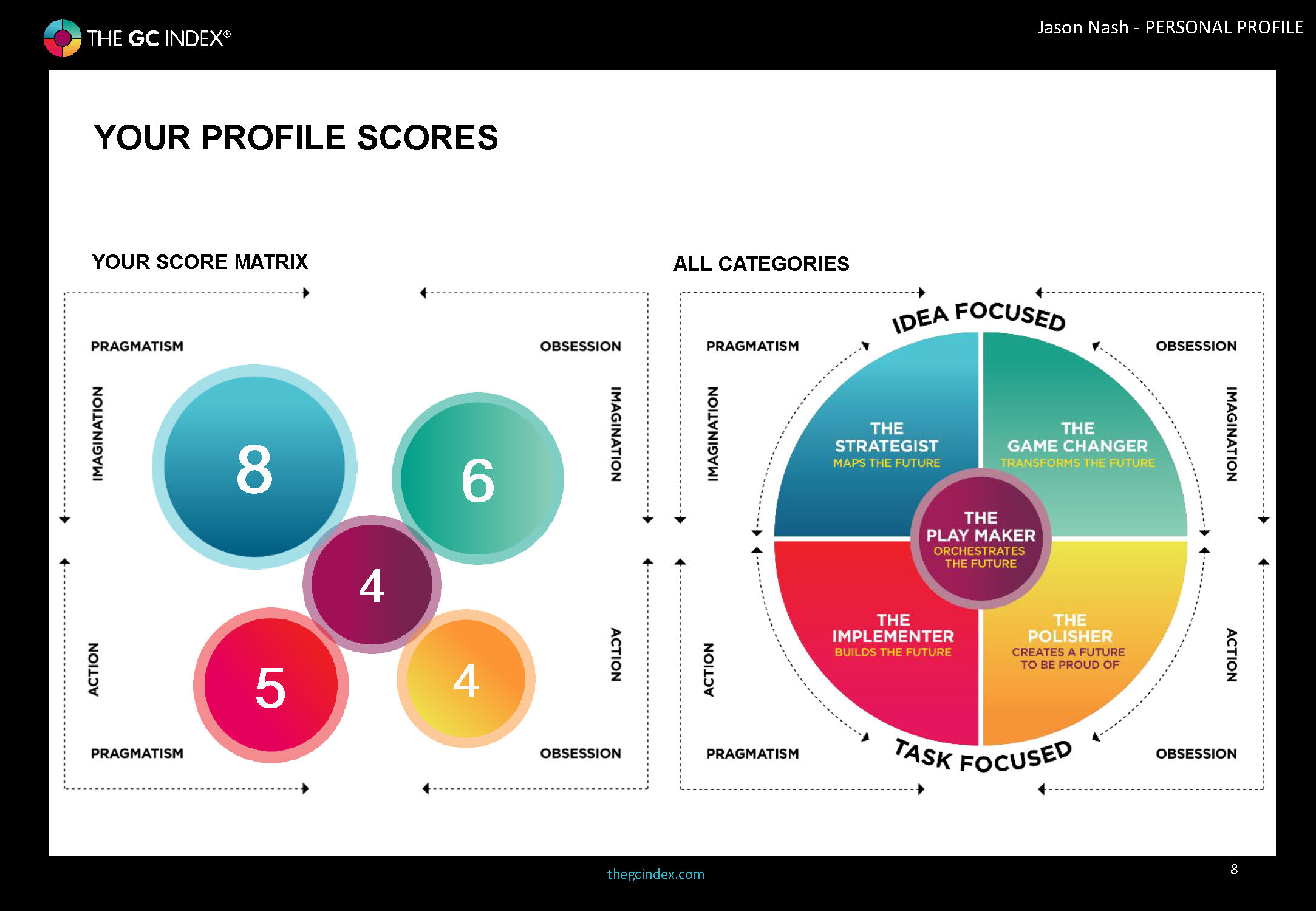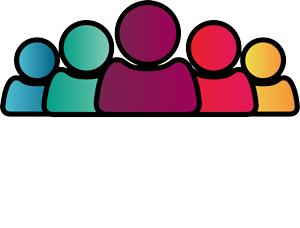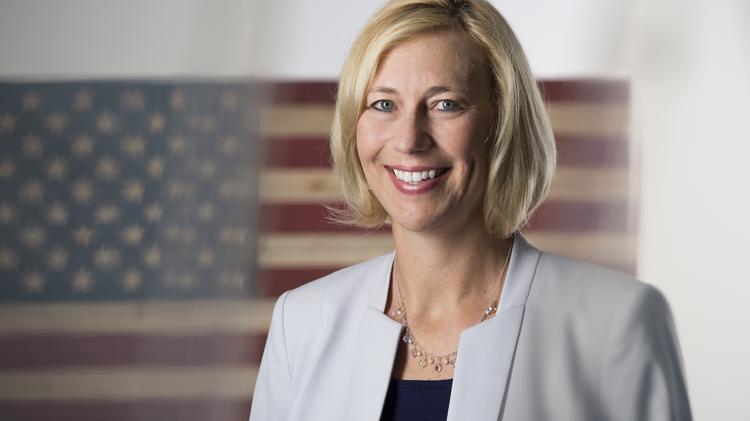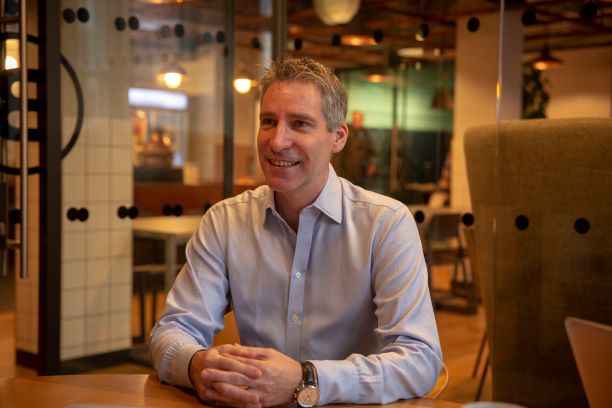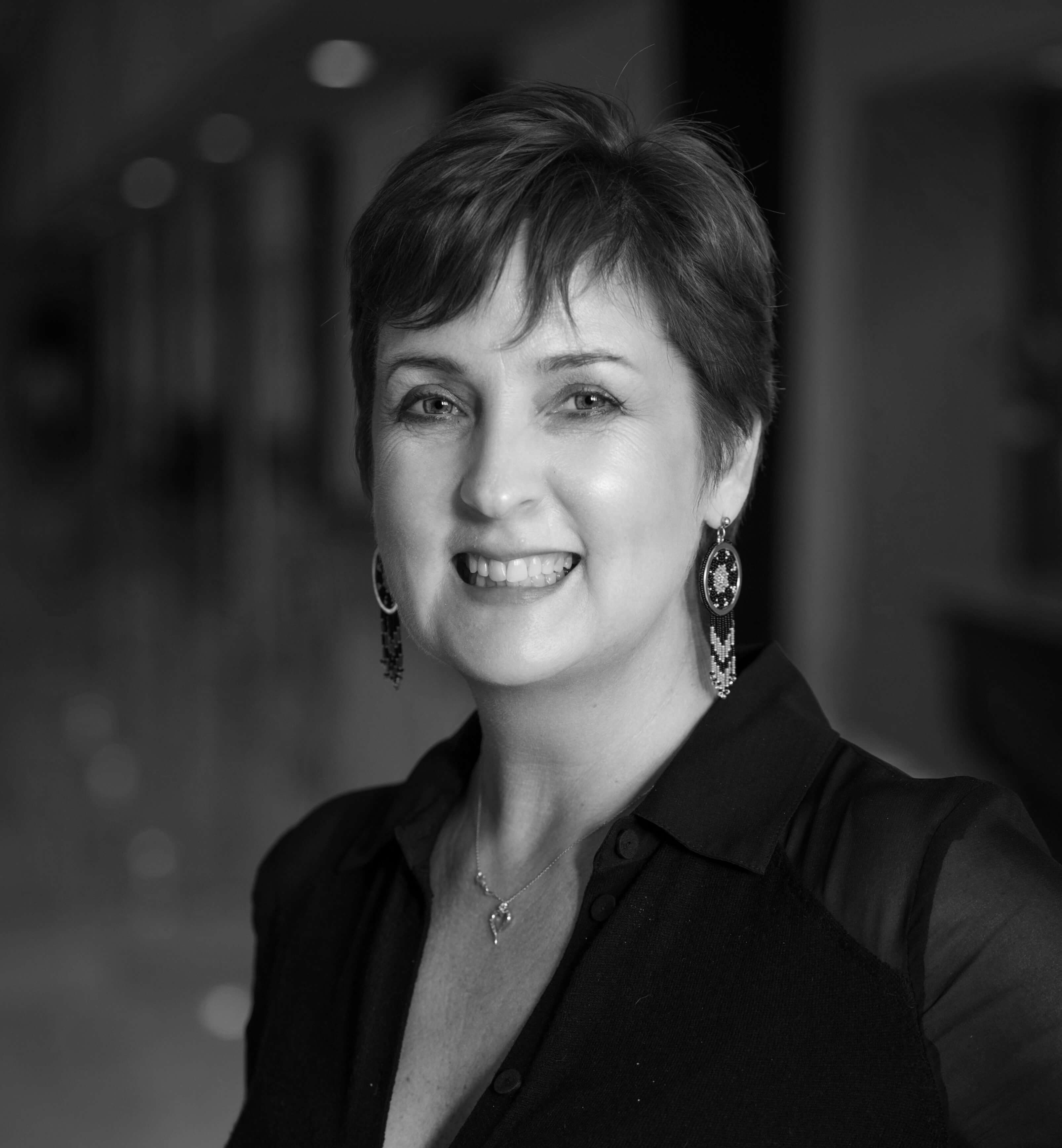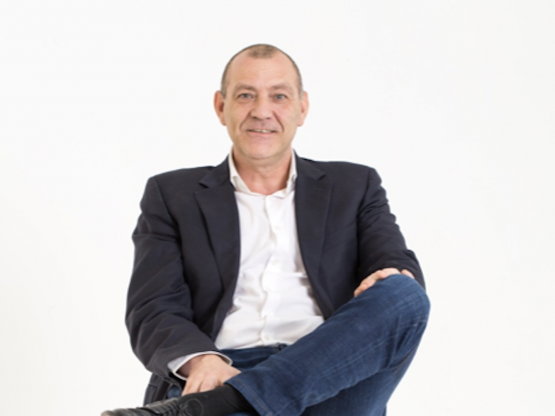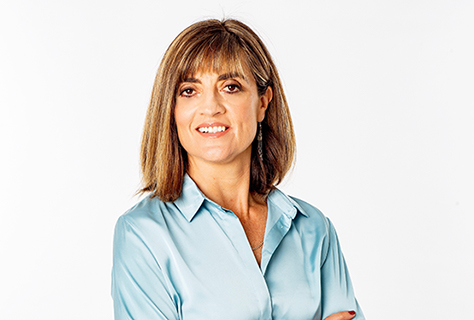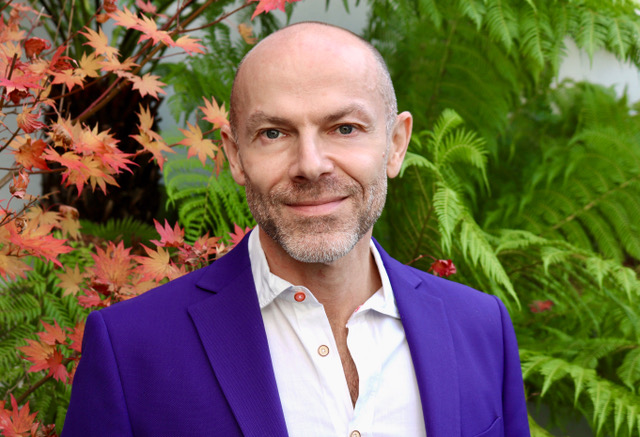
Founder & CEO
Curious Cognition
Strategist/Game ChangerJason Nash has worked for most of the last 25 years in a range of businesses primarily involved in digital transformation or digital product management in a number of different organisations.
Jason then decided to set up his own consulting organisation, Curious Cognition. Jason says "I am a very curious person. I started Curious Cognition about 18 months or so back, working with a range of different companies across industries. I help them with getting their product management strategy in order, developing their growth programmes and pulling their digital products all together".
What would you say you have learned about yourself and your impact having taken the GC Index profile?
I have had a pretty varied career, and I have worked in a lot of different industries and I always think that your ability to add value in an organisation is as much about the diversity of the background you have had as it is about the deep skillset that you have developed. And I guess that I have always been aware that my brain is wired up a little different from the average person. I am dyslexic and I know that can be a limitation at times. I have had numerous amusing spelling mistakes in my career which we wont go into in this conversation. But I always knew that I was wired up a little differently and I have always described it as being a horizontal thinker. I am very good at seeing patterns and connecting things up, that maybe other people don’t necessarily see or they may see but may not see the ongoing ramifications to where that may lead to.
Having gone through the GC Index, and being classified as a Strategic Game Changer, with the Strategy element being my leading score and the Game Changer being my secondary score, it was actually really useful for me to actually be able to label if you like, some of the way I think about things and the way I approach things. I also had a pretty high score in the Implementer piece which also demonstrated why I like to roll my sleeves up and get the first version of something delivered and actually help brainstorm the process you might want to work on to actually get something working. Once that first version is done I am happy to hand it off and work with people and bring people into the teams I have worked with to drive the initiative forwards from that point. But I think that ability to be able to – and some people call it the big picture – and there are lots of different labels out there in the world for this. But I think it is fair to say that I have in my working career at times it can be a curse aswell as being a blessing because you can be in a room, talking about concepts and ideas, which to you seem very very obvious, but maybe to other people in the room it seems a bit pie in the sky or a bit out of there.
I’ll give an example maybe if I could because I think it might be useful. You think about the impact of driverless cars on society and the impact the world and so obviously that is going to impact the car drivers in the world, people that drive for a living. But then it also has the knock on affect of, well that is going to affect people who are going to buy cars, so the servicing industry is going to be affected, the insurance industry is going to be affected, car parks are going to be affected. SO all of these other industries certainly start to have these knock on effects, that when you think about it, it has this huge impact, outside of which initially seemed like a pretty small part of something that you were working on. And I guess that in the Automotive product side I have built in the past, when I worked in the video industry, I have always looked for those knock on affects from a product or a service doing something and how that will then impact elements within either that company’s portfolio of products or broadly in society and the way it works. And so I think it is an interesting way in how I see the world and it is great personally for me and I have been able to understand a little more about that and the labels to use when I am talking to people about the concepts and ideas.
Having gone through the GC Index, and being classified as a Strategic Game Changer, with the Strategy element being my leading score and the Game Changer being my secondary score, it was actually really useful for me to actually be able to label if you like, some of the way I think about things and the way I approach things. I also had a pretty high score in the Implementer piece which also demonstrated why I like to roll my sleeves up and get the first version of something delivered and actually help brainstorm the process you might want to work on to actually get something working. Once that first version is done I am happy to hand it off and work with people and bring people into the teams I have worked with to drive the initiative forwards from that point. But I think that ability to be able to – and some people call it the big picture – and there are lots of different labels out there in the world for this. But I think it is fair to say that I have in my working career at times it can be a curse aswell as being a blessing because you can be in a room, talking about concepts and ideas, which to you seem very very obvious, but maybe to other people in the room it seems a bit pie in the sky or a bit out of there.
I’ll give an example maybe if I could because I think it might be useful. You think about the impact of driverless cars on society and the impact the world and so obviously that is going to impact the car drivers in the world, people that drive for a living. But then it also has the knock on affect of, well that is going to affect people who are going to buy cars, so the servicing industry is going to be affected, the insurance industry is going to be affected, car parks are going to be affected. SO all of these other industries certainly start to have these knock on effects, that when you think about it, it has this huge impact, outside of which initially seemed like a pretty small part of something that you were working on. And I guess that in the Automotive product side I have built in the past, when I worked in the video industry, I have always looked for those knock on affects from a product or a service doing something and how that will then impact elements within either that company’s portfolio of products or broadly in society and the way it works. And so I think it is an interesting way in how I see the world and it is great personally for me and I have been able to understand a little more about that and the labels to use when I am talking to people about the concepts and ideas.
How do you bridge the gaps between you, as a strategist game changer, and those who have a different set of proclivities to yourself?
The interesting thing is that the true game changers out there are very obsessive in the way that they approach the world and they don’t have any time for getting the work delivered if you like.
And so those people who are the true Game changers out there can also be seen as almost on the autistic scale because they are so obsessed. My partner is on that scale aswell and I know that can be a blessing and a curse because it means you can be super focussed on getting something done.
In my own case, that idea of mapping the future, which the strategist is all about, I am all about painting that big picture and getting everybody on that journey and I recognise the power of words and communication. If you don’t have your team on board with you, it is very hard to get people to move forwards and really drive the agenda that you want. But I am not a playmaker, I am not that super orchestrating person that sits in the middle and joins everybody up. Having somebody like that on the team, working with you, is super valuable because they are always going to pull all of those strands together to make everybody work in that cohesive and really effective way of working.
What I do have a slightly highest skill on is on that implementing side though, not super high, but enough to want to get processes in place and get thing working. We walk specifically about the processes there and I feel that in my working life, and being exposed to agile processes and thinking pretty early on because of my engagement in the automotive space. So where a lot of people have come into agile product management and agile thinking through things like scaled agile framework, I had a lot of exposure to this in the automotive industry, which of course is Toyota where it originally came from. So I have been a big fan of agile skills, agile approaches, things like business model canvases as a very quick way of being able to draw up something that historically would have been written out at length by those more implementing and procedural type, the polisher type people and the reason for that, as well as my dyslexia, if you are dyslexic you don’t want to write lots of pro’s because you know it is going to be error prone and I tend to be very verbose when I write as odd as that may sound So I have tended to look for those techniques and tools that have helped me be able to tell that story, paint that picture and get people on the same page, with as few words as possible and I think frameworks like the business model canvas and the value prop canvas, techniques like scaled agile framework, or just agile in principle whether that’s SCRUM or one of the other techniques, that can be a really useful way to be able to get people moving, to get the momentum going to get things and people focussed on the outcome, which I feel is super important for new ideas as much as it is for existing work that needs to get done and delivered.
And so those people who are the true Game changers out there can also be seen as almost on the autistic scale because they are so obsessed. My partner is on that scale aswell and I know that can be a blessing and a curse because it means you can be super focussed on getting something done.
In my own case, that idea of mapping the future, which the strategist is all about, I am all about painting that big picture and getting everybody on that journey and I recognise the power of words and communication. If you don’t have your team on board with you, it is very hard to get people to move forwards and really drive the agenda that you want. But I am not a playmaker, I am not that super orchestrating person that sits in the middle and joins everybody up. Having somebody like that on the team, working with you, is super valuable because they are always going to pull all of those strands together to make everybody work in that cohesive and really effective way of working.
What I do have a slightly highest skill on is on that implementing side though, not super high, but enough to want to get processes in place and get thing working. We walk specifically about the processes there and I feel that in my working life, and being exposed to agile processes and thinking pretty early on because of my engagement in the automotive space. So where a lot of people have come into agile product management and agile thinking through things like scaled agile framework, I had a lot of exposure to this in the automotive industry, which of course is Toyota where it originally came from. So I have been a big fan of agile skills, agile approaches, things like business model canvases as a very quick way of being able to draw up something that historically would have been written out at length by those more implementing and procedural type, the polisher type people and the reason for that, as well as my dyslexia, if you are dyslexic you don’t want to write lots of pro’s because you know it is going to be error prone and I tend to be very verbose when I write as odd as that may sound So I have tended to look for those techniques and tools that have helped me be able to tell that story, paint that picture and get people on the same page, with as few words as possible and I think frameworks like the business model canvas and the value prop canvas, techniques like scaled agile framework, or just agile in principle whether that’s SCRUM or one of the other techniques, that can be a really useful way to be able to get people moving, to get the momentum going to get things and people focussed on the outcome, which I feel is super important for new ideas as much as it is for existing work that needs to get done and delivered.
Which of your roles, would you say, have been most in tune with your natural proclivities?
I think you can have moments in your working life, where you can be in the right place at the right time doing the right work, and then because of changes in the environment and people, things can go in different places. So I think there have been moments in my career where things have all been lined up and working really well. When I worked in Powerway Indianapolis, working for the Automotive supply chain company, we did some really interesting work there and was really thinking outside of the box on that particular product set. That sort of Game changing, painting the vision of the future, when we worked with Chrysler and secured $25m of investments through that and then scaled up the business from tens of people to 300 through a course of a little over 18 months, that was a really great place to be at that time and I think my skillset worked really well.
At Microsoft, actually building our a local Government accelerator for dynamic CRM was something that was really interesting and how we took what was a CRM product, which is a broad product category, but we really verticalised it for a specific niche market. We built at a number of great customer wins in that space, and I actually won a Microsoft Gold Award as part of that which is a pretty coveted award within the Microsoft environment.
Then at Travelport, they are at a more senior role, building a team and bringing the right people in, I worked very closely with the, then CIO Mark Ryan, who is an ex-IBM guy and together we sponsored a number of initiatives and one of which was bringing user-experience people into the organisation in order to start working on customer journey mapping and really understanding all of the elements of what the B2B travel experience was and this was part of the work that ultimately led Travelport to becoming a more B2B 4C and worrying about the end customer being in the B2B environment we were in. as part of that we brought some really great user-experience people into the organisation, who were definitely more of those polishing, high detailed people who were able to work on how the product needed to physically all interact with the users. Interestingly, some of the people I worked with in that environment are now working at Spotify in a B2C environment. So I think that great examples of being aware of how this worked but previously not having labels for those kind of people. So I think the Index has a real value in terms of people who are trying to build more of this Strategic, Game changing approach to the business. To make that land you need a team of multiple skillsets and I think, having the ability to put labels on these things and then trying to identify the right people within your organisation or outside of the organisation to bring in to upskill is a really critical thing people need to do when building the right teams. But also then to be able to build and give people skills opportunities within their own organisations.
At Microsoft, actually building our a local Government accelerator for dynamic CRM was something that was really interesting and how we took what was a CRM product, which is a broad product category, but we really verticalised it for a specific niche market. We built at a number of great customer wins in that space, and I actually won a Microsoft Gold Award as part of that which is a pretty coveted award within the Microsoft environment.
Then at Travelport, they are at a more senior role, building a team and bringing the right people in, I worked very closely with the, then CIO Mark Ryan, who is an ex-IBM guy and together we sponsored a number of initiatives and one of which was bringing user-experience people into the organisation in order to start working on customer journey mapping and really understanding all of the elements of what the B2B travel experience was and this was part of the work that ultimately led Travelport to becoming a more B2B 4C and worrying about the end customer being in the B2B environment we were in. as part of that we brought some really great user-experience people into the organisation, who were definitely more of those polishing, high detailed people who were able to work on how the product needed to physically all interact with the users. Interestingly, some of the people I worked with in that environment are now working at Spotify in a B2C environment. So I think that great examples of being aware of how this worked but previously not having labels for those kind of people. So I think the Index has a real value in terms of people who are trying to build more of this Strategic, Game changing approach to the business. To make that land you need a team of multiple skillsets and I think, having the ability to put labels on these things and then trying to identify the right people within your organisation or outside of the organisation to bring in to upskill is a really critical thing people need to do when building the right teams. But also then to be able to build and give people skills opportunities within their own organisations.
How do you think your GC Index profile will inform your future direction and where would you best fit?
One of the things I loved about getting the report back is, there is a page in the report about who you are like in terms of other people out there and with me being a Strategist first and a Game changer second, I am paired up with the Elon Musk which I loved and everybody aspired to be an Elon Musk or a Steve Jobs or whoever it is. You have to take these things with a pinch of salt but I loved the fact that, that was there.
I think in my own mind, what it has helped me understand, is that I have always been a, somebody that has always been, somebody that knows me and have been in a room with me, I am pretty fast thinking, I see these opportunities but I never really understood why I did or how that was a little different for many people that are out there. From my understanding, the combination have is a fairly rare combination as well, so the way I am look forwards is that I want to make sure I am in that kind of role where I can leverage this creative skill I have and I know in the past if I am doing the same thing for too long, I definitely can get bored. So what is important to me as I either work with new clients or art of my goal for this year is to consider going back into a full time role with the right employer is to try and find an opportunity where I can use this skill to really help me and the organisation I am working with to look for those business models and new way of approaching problem solving. One of the things I took last year was an MIT course in AI & Strategy – an 8 week online course – I really enjoyed digging into the subject that I had read up about quite a bit but not gone quite as deep. I have always been a Techno-file, technology has always helped me with my dyslexia, but I really feel that AI is such a Game changing technology and I fell very few people in organisations truly understand the true opportunity that it represents, so from my own perspective, I am doubling down on trying to understand more about that and would love to work within an organisation or with clients who have a need or desire to do that. I think that is definitely one of the key areas that I would love to get more involved in and really figure out how I do more of those things.
I think in my own mind, what it has helped me understand, is that I have always been a, somebody that has always been, somebody that knows me and have been in a room with me, I am pretty fast thinking, I see these opportunities but I never really understood why I did or how that was a little different for many people that are out there. From my understanding, the combination have is a fairly rare combination as well, so the way I am look forwards is that I want to make sure I am in that kind of role where I can leverage this creative skill I have and I know in the past if I am doing the same thing for too long, I definitely can get bored. So what is important to me as I either work with new clients or art of my goal for this year is to consider going back into a full time role with the right employer is to try and find an opportunity where I can use this skill to really help me and the organisation I am working with to look for those business models and new way of approaching problem solving. One of the things I took last year was an MIT course in AI & Strategy – an 8 week online course – I really enjoyed digging into the subject that I had read up about quite a bit but not gone quite as deep. I have always been a Techno-file, technology has always helped me with my dyslexia, but I really feel that AI is such a Game changing technology and I fell very few people in organisations truly understand the true opportunity that it represents, so from my own perspective, I am doubling down on trying to understand more about that and would love to work within an organisation or with clients who have a need or desire to do that. I think that is definitely one of the key areas that I would love to get more involved in and really figure out how I do more of those things.
Any last thoughts…?
For anybody that is thinking in their organisation if they are looking for some kind of transformational change in the organisation or they are looking for some kind of digital transformation, I would strongly encourage them to take a look at the GC Index to try and identify skills within their own organisation today who may not be leveraged to their full extent. Because these hidden gems may already be in the organisation, hitting their heads against the procedures and politics that exist in business and maybe not getting the full scope to be able to do great things. I think this could un-counter some people in the organisation that they could use and leverage appropriately for some of those transformations and changes that they are doing.
I found it super helpful in my own case.
I found it super helpful in my own case.
Interviewed by – The GC Index

